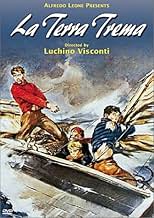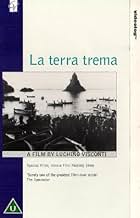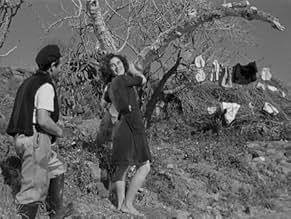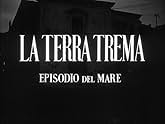AVALIAÇÃO DA IMDb
7,8/10
6 mil
SUA AVALIAÇÃO
Na zona rural da Sicília, os pescadores vivem à mercê de atacadistas gananciosos. Uma família arrisca tudo para comprar seu próprio barco e operar de forma independente.Na zona rural da Sicília, os pescadores vivem à mercê de atacadistas gananciosos. Uma família arrisca tudo para comprar seu próprio barco e operar de forma independente.Na zona rural da Sicília, os pescadores vivem à mercê de atacadistas gananciosos. Uma família arrisca tudo para comprar seu próprio barco e operar de forma independente.
- Direção
- Roteiristas
- Artistas
- Prêmios
- 1 vitória e 1 indicação no total
Luchino Visconti
- Narrator
- (narração)
- (não creditado)
Antonio Pietrangeli
- Narrator
- (narração)
- (não creditado)
Antonio Arcidiacono
- Ntoni
- (não creditado)
Giuseppe Arcidiacono
- Cola
- (não creditado)
Venera Bonaccorso
- La vecchia che ride
- (não creditado)
Nicola Castorino
- Nicola
- (não creditado)
Rosa Catalano
- Rosa
- (não creditado)
Rosa Costanzo
- Nedda
- (não creditado)
Alfio Fichera
- Michele
- (não creditado)
Carmela Fichera
- La baronessa
- (não creditado)
Agnese Giammona
- Lucia
- (não creditado)
Nelluccia Giammona
- Mara
- (não creditado)
Ignazio Maccarone
- Maccarone
- (não creditado)
Giovanni Maiorana
- Un bambino
- (não creditado)
Antonino Micale
- Vanni
- (não creditado)
Maria Micale
- La madre
- (não creditado)
- Direção
- Roteiristas
- Elenco e equipe completos
- Produção, bilheteria e muito mais no IMDbPro
Avaliações em destaque
It's hard to believe that I am the first person to comment on this masterpiece at this website. One reason could be that it's not that easy to see. Thank God for Turner Classic Movies, which is where I finally saw it. I'm happy to see that there's a DVD available.
This is one of those amazing films that uses only non-professionals and in which they perform as well, if not better, than any professional could. The actors are the inhabitants of a small Sicilian fishing village. The film is cliche-ridden (the Marxist variety) and at times predictable. I didn't care about any of this. The film is a true epic about a few people trying to break out of their rut of exploitation and the wretchedness of their everyday living, and failing. The film thus achieves the status of true tragedy. This one shouldn't be missed.
This is one of those amazing films that uses only non-professionals and in which they perform as well, if not better, than any professional could. The actors are the inhabitants of a small Sicilian fishing village. The film is cliche-ridden (the Marxist variety) and at times predictable. I didn't care about any of this. The film is a true epic about a few people trying to break out of their rut of exploitation and the wretchedness of their everyday living, and failing. The film thus achieves the status of true tragedy. This one shouldn't be missed.
This moving slice of life has several acts and moves like an opera, but the scenes are "neo-realistic" in the best sense.
All of Visconti's actors are from the Sicilian fishing village, but they were not acting--just portraying their lives. You care about these real people!
Family is everything--and it survives despite the buffeting by the storms, the stranglehold of the oligarchical wholesalers, and shortsightedness of the townspeople. We see the exploitation of the fishermen vividly and how most accept it as "God's will."
It also brings to mind the old joke: What is the difference between capitalism and communism? Capitalism is the exploitation of man by man, and communism is just the reverse.
All of Visconti's actors are from the Sicilian fishing village, but they were not acting--just portraying their lives. You care about these real people!
Family is everything--and it survives despite the buffeting by the storms, the stranglehold of the oligarchical wholesalers, and shortsightedness of the townspeople. We see the exploitation of the fishermen vividly and how most accept it as "God's will."
It also brings to mind the old joke: What is the difference between capitalism and communism? Capitalism is the exploitation of man by man, and communism is just the reverse.
Luchino Visconti's vivid portrayal of the grinding poverty endured by Sicilian fishermen under the oppressive rule of grasping wholesalers is a relentlessly grim saga that casts an unflattering light on the crowd's blind propensity to condemn those who strive to rise above their lot in life. Depressing stuff, but hugely compelling in spite of its lengthy running time.
In 1947, in Sicily near Catania, the fishermen in Aci Trezza have been exploited by generations by the local middlemen. The young 'Ntoni Valastro rebels against the economical situation of his poor family and convinces the Valastro to mortgage their simple house in the Fidania Bank in Catania to buy a fish boat of their own and never work again for the wholesalers. In a stormy day, he decides to fish due to the necessity of repaying the debt to the bank; however, the storm destroys his boat and the dream of his family. Without any support and job, 'Ntoni sees the disintegration of his outcast family.
"La Terra Trema: Episodio del Mare" is a heartbreaking, bitter and cruel story of a family of fishermen that decides to change their poor economical situation facing the powerful exploiters. The Marxist "Red Count" Luchino Visconti directs and narrates this little masterpiece of the Italian Neo-Realism casting non-professional actors and actresses, actually fishermen and inhabitants of Aci Trezza. The abusive treatment of the greedy and idle wholesalers gives an idea of how workers were exploited in this period of history and the reason for the ideological fight of classes between Communism and Capitalism. In Brazil, this film was released on DVD by Versátil Distributor. My vote is nine.
Title (Brazil): "A Terra Treme" ("The Earth Shakes")
"La Terra Trema: Episodio del Mare" is a heartbreaking, bitter and cruel story of a family of fishermen that decides to change their poor economical situation facing the powerful exploiters. The Marxist "Red Count" Luchino Visconti directs and narrates this little masterpiece of the Italian Neo-Realism casting non-professional actors and actresses, actually fishermen and inhabitants of Aci Trezza. The abusive treatment of the greedy and idle wholesalers gives an idea of how workers were exploited in this period of history and the reason for the ideological fight of classes between Communism and Capitalism. In Brazil, this film was released on DVD by Versátil Distributor. My vote is nine.
Title (Brazil): "A Terra Treme" ("The Earth Shakes")
Luchino Visconti's epic on a family living in the Sicilian fishing village of Trezza, the Valastros, is a compelling story, told with sincerity and skill, and for the outsider viewing into their world it's at the least interesting and at its most heart-felt is rather affecting. Narrators Visconti and Antonio Pietrangeli themselves are outsiders to the world of dirt-poor fishermen who work their entire lives to earn pittance for the wealthy wholesalers (it's based on a novel, I Malavoglia- translated as Ill Will- by Giovanni Verga).
Their narration can hint the audience member on little details that wouldn't be known from the characters, however sometimes their voice-over, in such a documentary style (before this Visconti was among a group of directors for a documentary during world war 2 that is not listed on this site but it mentioned in the documentary My Voyage to Italy) can be a little deterring as they mention certain emotions the characters are feeling that we as the audience can determine right in the eyes.
The story tells of the Valastros, in particular 'Ntoni, an idealist who returns from fighting in the war with a much different view of the environment around him than what his elders would want to believe. Unlike his grandfather, who has worked for the wholesalers and not earned and saved a cent more or less than his children, he wants change in the way things are done, and soon gets enough money to build his own boat and to sell his own fish.
Things look optimistic, until nature intervenes in destroying the boat, leaving 'Ntoni without a job, the wholesalers laughing at him mercilessly and little by little loosing any respect he had in the village. His other family members also get time on the screen- two sisters who want to meet a man to marry, and how one is at the will of God and the other is at the will of the Don of the village, Don Salvatore; also a brother, who after losing his job becomes a smuggler bringing in cigarettes. Their stories, in a pacing that may have some wondering when it will end and some wondering if it can go on longer, lead up to a heartbreaking climax for each of them.
I learned shortly after viewing La Terra Trema that Luchino Visconti (I suppose it shouldn't have been much of a surprise considering the state Italy was in before, during, and after the war) was a lifelong member of the Communist party despite being raised in a wealthy environment in Northern Italy. While I had a feeling there was something about the way Visconti depicted the Volostros and the nature of the people and the village that seemed "for the working man", but I didn't really feel that the political intonations were a crutch to the overall execution of the film. Since one of the pin-points of neo-realism is to tell things as simply as they unfold in real life, no matter how downtrodden it can get, the focus of the fishermen versus the wholesalers is made more as a reflection of basic good versus evil, and it can appeal to those who don't want a strict tale of classes.
Its humanity is what shines through, and that is what should appeal to connoisseurs of neo-realism and Italian filmmaking; while I can't quite recommend it as much as The Bicycle Thief or Open City, I can recommend it as the first film people should see if they want to know and understand the work of Visconti, his operatic intonations with his players a graceful counterpart to his documentary techniques.
Their narration can hint the audience member on little details that wouldn't be known from the characters, however sometimes their voice-over, in such a documentary style (before this Visconti was among a group of directors for a documentary during world war 2 that is not listed on this site but it mentioned in the documentary My Voyage to Italy) can be a little deterring as they mention certain emotions the characters are feeling that we as the audience can determine right in the eyes.
The story tells of the Valastros, in particular 'Ntoni, an idealist who returns from fighting in the war with a much different view of the environment around him than what his elders would want to believe. Unlike his grandfather, who has worked for the wholesalers and not earned and saved a cent more or less than his children, he wants change in the way things are done, and soon gets enough money to build his own boat and to sell his own fish.
Things look optimistic, until nature intervenes in destroying the boat, leaving 'Ntoni without a job, the wholesalers laughing at him mercilessly and little by little loosing any respect he had in the village. His other family members also get time on the screen- two sisters who want to meet a man to marry, and how one is at the will of God and the other is at the will of the Don of the village, Don Salvatore; also a brother, who after losing his job becomes a smuggler bringing in cigarettes. Their stories, in a pacing that may have some wondering when it will end and some wondering if it can go on longer, lead up to a heartbreaking climax for each of them.
I learned shortly after viewing La Terra Trema that Luchino Visconti (I suppose it shouldn't have been much of a surprise considering the state Italy was in before, during, and after the war) was a lifelong member of the Communist party despite being raised in a wealthy environment in Northern Italy. While I had a feeling there was something about the way Visconti depicted the Volostros and the nature of the people and the village that seemed "for the working man", but I didn't really feel that the political intonations were a crutch to the overall execution of the film. Since one of the pin-points of neo-realism is to tell things as simply as they unfold in real life, no matter how downtrodden it can get, the focus of the fishermen versus the wholesalers is made more as a reflection of basic good versus evil, and it can appeal to those who don't want a strict tale of classes.
Its humanity is what shines through, and that is what should appeal to connoisseurs of neo-realism and Italian filmmaking; while I can't quite recommend it as much as The Bicycle Thief or Open City, I can recommend it as the first film people should see if they want to know and understand the work of Visconti, his operatic intonations with his players a graceful counterpart to his documentary techniques.
Você sabia?
- CuriosidadesThe cast was exclusively composed of non-professional actors. They were genuine fishermen and inhabitants of Aci Trezza (Sicily). The credits do not name any of the actors, who are collectively listed as "Pescatori Siciliani" (Sicilian Fishermen).
- Citações
Title Card: [in Italian] In Sicily, Italian is not the language of the poor.
- Versões alternativasWas originally released without Italian narration, but it flopped because the Italian audience could not understand the Sicilian dialect. Visconti re-released it with his own narration, which many find detracts from the film.
- ConexõesEdited into Bellissimo: Immagini del cinema italiano (1985)
Principais escolhas
Faça login para avaliar e ver a lista de recomendações personalizadas
- How long is La Terra Trema?Fornecido pela Alexa
Detalhes
Bilheteria
- Faturamento bruto mundial
- US$ 1.664
- Tempo de duração
- 2 h 40 min(160 min)
- Cor
- Proporção
- 1.37 : 1
Contribua para esta página
Sugerir uma alteração ou adicionar conteúdo ausente











